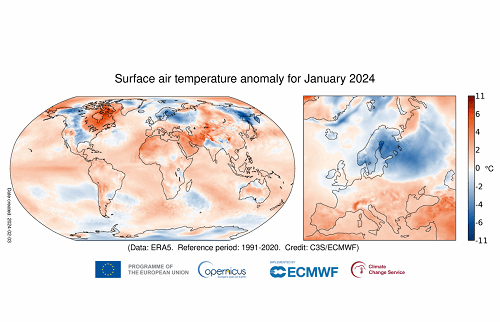Employers must urgently consider how climate change will affect their businesses and how they will protect the health and wellbeing of their workforces as global temperatures continue to rise, the British Safety Council’s director of education and membership, Dr Julie Riggs, has urged.
News
Employers must act now to protect workers from effects of climate change, as 1.5C threshold breached
The statement comes as the European Union’s Copernicus Climate Change Service published data showing that the global mean temperature over the last 12 months was the highest on record, breaching the 1.5C long-term limit set by world leaders in the 2015 Paris Agreement.
During the period between February 2023 and January 2024, the average global temperature was 1.52C above pre-industrial levels and 0.64C above the 1991-2020 average.
 Photograph: Copernicus Climate Change Service/ECMWF
Photograph: Copernicus Climate Change Service/ECMWF
“2024 starts with another record-breaking month – not only is it the warmest January on record but we have also just experienced a 12-month period of more than 1.5C above the pre-industrial reference period,” said Samantha Burgess, deputy director of the Copernicus Climate Change Service, adding that “rapid reductions in greenhouse gas emissions are the only way to stop global temperatures rising”.
Humanity is in “code red”, warned the British Safety Council’s Dr Riggs, and employers and workers will need to adapt and manage the new risks posed by the changing climate.
“We are now accelerating towards 2C of global warming, above which the devastation to our environment and the risks to the health, safety and wellbeing of workers around the world will grow exponentially,” said Dr Riggs. “We would urge all employers to conduct an analysis of climate risk impact to their businesses, including extreme weather, an increase in biological risks and increased risk of accidents.”
 Dr Julie Riggs, British Safety Council: "We are now accelerating towards 2C of global warming, above which the devastation to our environment and the risks to the health, safety and wellbeing of workers around the world will increase exponentially." Photograph: iStock/peepo
Dr Julie Riggs, British Safety Council: "We are now accelerating towards 2C of global warming, above which the devastation to our environment and the risks to the health, safety and wellbeing of workers around the world will increase exponentially." Photograph: iStock/peepo
A recent report by the Environmental Audit Committee (EAC) warned that as global temperatures continue to increase, heatwaves could claim up to 10,000 lives a year in the UK and cause work-related injuries to spike. The cross-party committee of MPs has urged the UK government to put in place a national heat resilience plan which prioritises passive cooling measures that do not exacerbate global warming.
While the temperature increase seen over the last 12 months may not continue at the current rate, “our window of opportunity is shrinking”, warned Dr Riggs.
“We must act now to save lives and our planet, and we all have a part to play.”
NEWS

Calls for more mental health support for NHS workers grow amid burnout fears
By Kerry Reals on 12 April 2024
Calls for the reinstatement of UK government funding for the provision of mental health and wellbeing hubs for NHS workers have amplified, as a new survey by the UNISON union warns that the threat of burnout could compound healthcare staff shortages.

Assault of retail workers to become a standalone crime in UK shoplifting crackdown
By Kerry Reals on 10 April 2024
Retailers have welcomed a UK government decision to make assaulting a shop worker a standalone criminal office in England and Wales, but civil liberties groups have criticised plans to ramp up the use of facial recognition technology in town centres to help catch shoplifters.

Teaching union calls for HSE to include suicides in work-related deaths figures
By Kerry Reals on 03 April 2024
Teaching union NASUWT has reiterated calls for suicides to be included in the Health and Safety Executive’s (HSE’s) annual figures on work-related deaths, and is calling for suicide prevention training to be provided for all school leaders.


